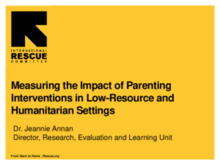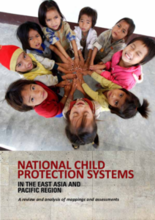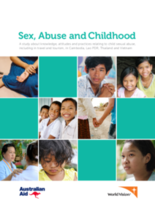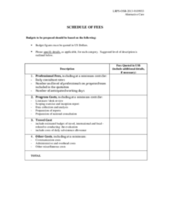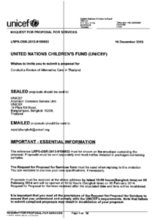This country page features an interactive, icon-based data dashboard providing a national-level overview of the status of children’s care and care reform efforts (a “Country Care Snapshot”), along with a list of resources and organizations in the country.
demographic_data
childrens_living_arrangement
children_living_without_bio
adoption
social_work_force
key_stakeholders
Key Stakeholders
Add New Datadrivers_of_institutionalisation
Drivers of Institutionaliziation
Add New Datakey_research_and_information
Key Data Sources
Add New DataThailand Alternative Care Case Study
Prevalence and number of children living in institutional care: global, regional, and country estimates
Displaying 81 - 90 of 103
This article from the BBC follows up on two recent “baby scandals” that emerged in Thailand last year.
This research brief provides an overview of an impact evaluation of the “Happy Families Program,” conducted by the International Rescue Committee (IRC). The Happy Families Program is a parenting and family skills intervention designed for Burmese families living on the Thai-Burmese border.
This report presents findings from the impact evaluation of a parenting and family skills intervention for the displaced Burmese population in Thailand called the Happy Families Program which was implemented by the IRC from 2011 to 2013.
This presentation from IRC, given at the State of the Evidence on Children’s Care Symposium, outlines the findings of recent research on parenting interventions in low-resource settings.
La Thaïlande maintient chaque année en détention des milliers d’enfants migrants, leur causant des dommages émotionnels et physiques, a déclaré Human Rights Watch dans un rapport. Des enfants migrants et demandeurs d’asile sont détenus de manière inutile dans des lieux de rétention sordides et des cellules de la police, en raison de leur statut en matière d’immigration ou de celui de leurs parents.
"About 21 per cent of children or more than three million children in Thailand do not live with either of their parents due to internal migration, a significant phenomenon that may have a long-term impact on the children’s development and well-being," says this press release from UNICEF.
This report presents the findings of a mappings and assessments review of child protection systems in 14 countries including Cambodia.
This report presents an overview of the findings of four separate studies conducted in vulnerable communities in Cambodia, Lao PDR, Thailand, and Vietnam on knowledge, attitudes and practices related to child sexual abuse, including in travel and tourism.
This document contains the Price Proposal Form for the UNICEF consultancy to conduct a Review of Alternative Care in Thailand: Policy to Practice with special focus on Children Affected by HIV/AIDS (CABA).
This document contains the RFP for UNICEF Thailand consultancy to conduct a Review of Alternative Care in Thailand: Policy to Practice with special focus on Children Affected by HIV/AIDS (CABA).



